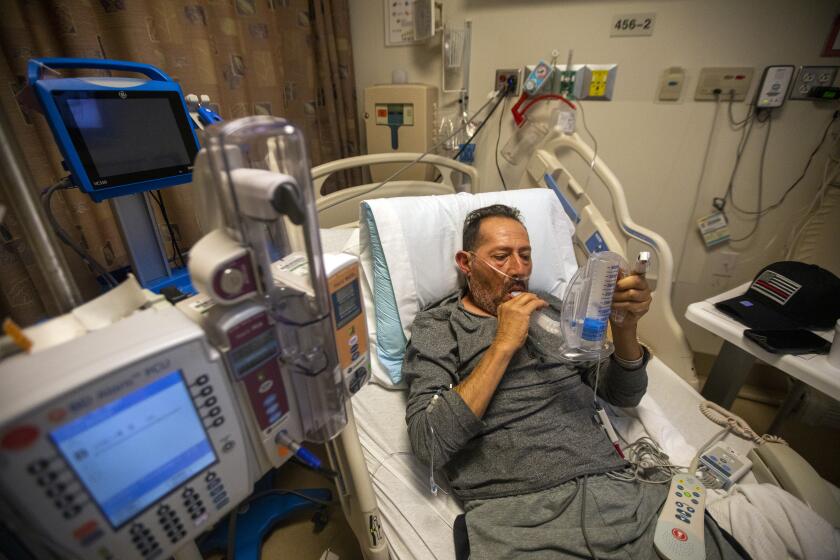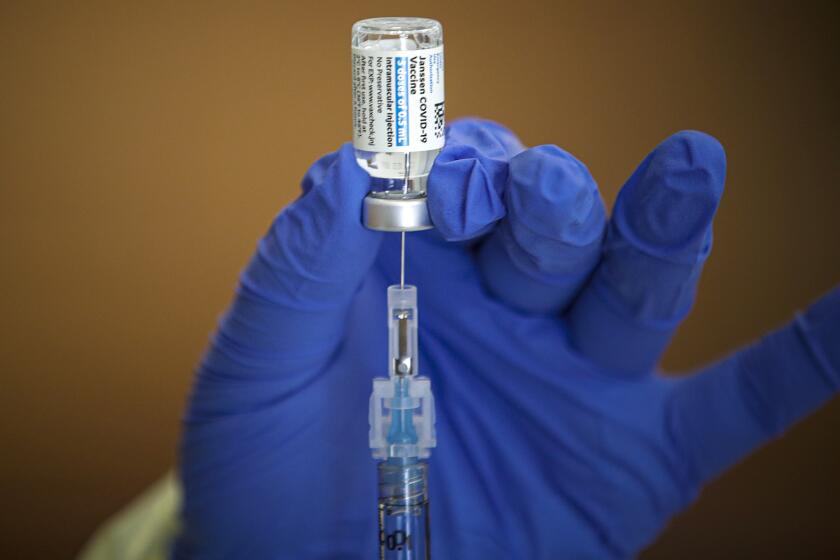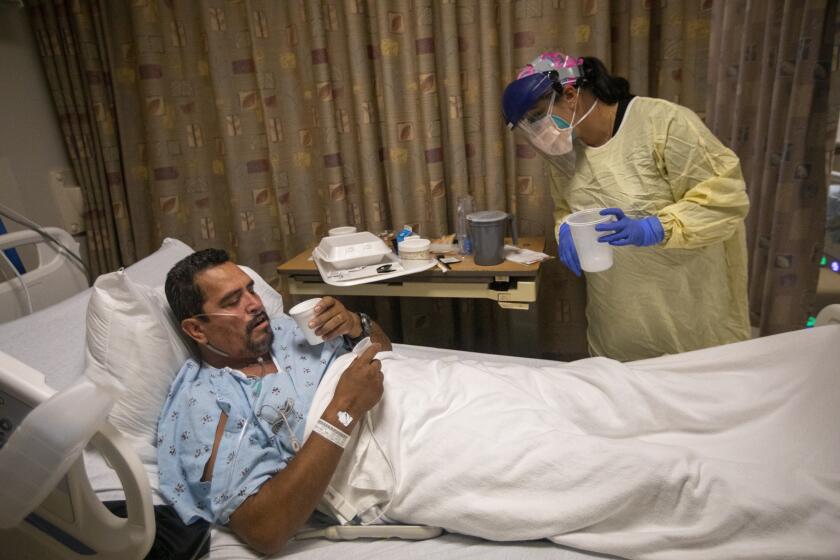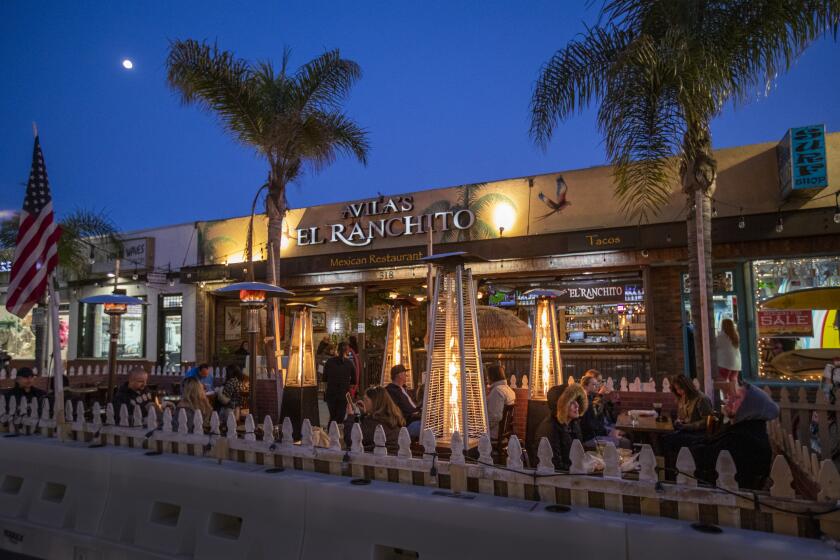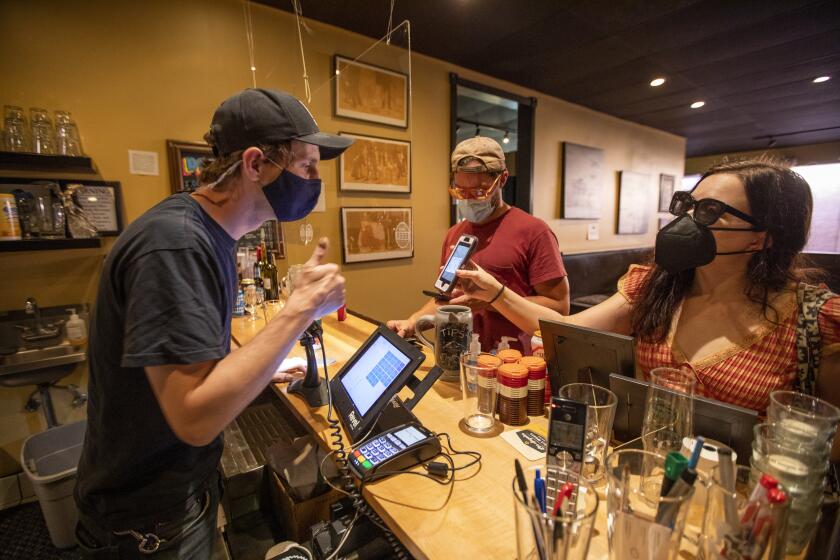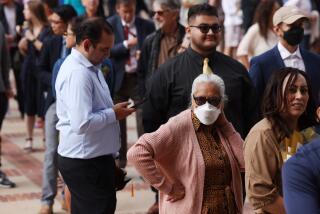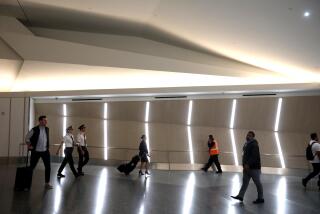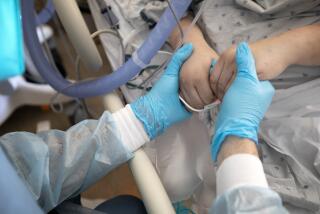Coronavirus case rate among unvaccinated Californians is six times that of the vaccinated
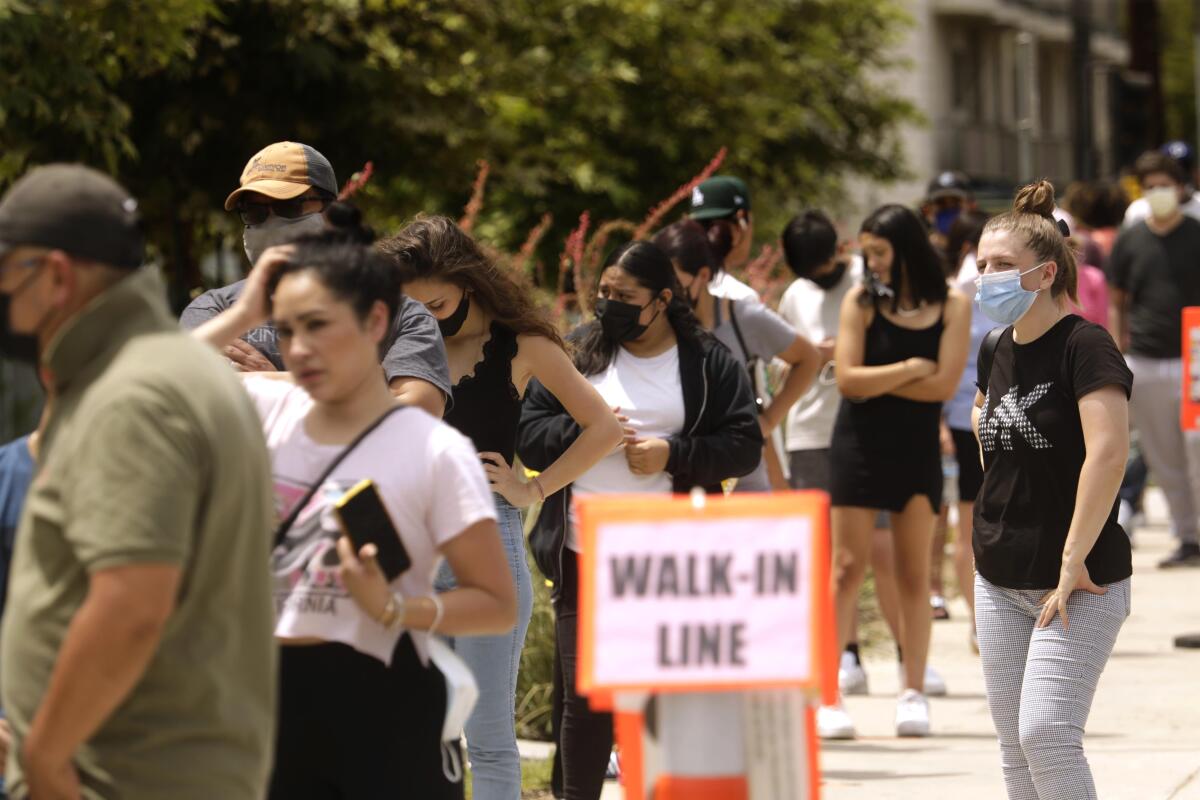
- Share via
The chasm in coronavirus case rates between unvaccinated and vaccinated Californians is continuing to widen, state data show, as some officials move more aggressively to require the shots as a precondition of both work and play.
For the week ending Saturday, the average case rate among uninoculated residents was 51 per 100,000 people per day. That’s more than six times the rate for those already vaccinated against COVID-19, 8.2 per 100,000 people per day, according to figures from the California Department of Public Health.
While both those numbers increased from the week before, the slope was far steeper for those who have yet to get their doses.
For the week of July 31, the average unvaccinated case rate was 33 per 100,000 people per day, compared with a rate of 7 per 100,000 people per day for those who had been vaccinated.
“The vast majority of new cases are among the unvaccinated,” California health officials wrote in a news release Thursday.
The latest data illustrate a point health officials have long stressed: Though it is possible for those who have been fully vaccinated to get infected, the chance of that happening is significantly lower than for those who have yet to roll up their sleeves.
“If everyone eligible were to get vaccinated, we would end up avoiding so much of the anxiety and distress that comes with having a loved one hospitalized with COVID, and almost no one would pass away from this infection,” Los Angeles County Public Health Director Barbara Ferrer said this week. “This is an achievable reality for us.”
The state has seen its total number of hospitalized coronavirus-positive patients swell from 2,981 on July 25 to 5,973 as of Sunday.
Despite the headline-grabbing examples of so-called breakthrough cases — when someone is infected with the coronavirus even after being vaccinated — data continue to show those have been an exceedingly rare occurrence.
As of Sunday, 57,491 post-vaccination cases had been identified statewide, a total that represents only about 0.3% of the more than 21.6 million Californians who are fully inoculated, state figures show.
Health officials say they’re largely unnecessary and the primary focus should be getting the unvaccinated to roll up their sleeves.
The story is much the same in L.A. County, which is home to a quarter of the state’s population. Out of the nearly 5.1 million Angelenos who had been fully vaccinated as of Tuesday, 21,532, or 0.42%, ended up later testing positive for the coronavirus; 549, or 0.01%, eventually wound up in a hospital with COVID-19; and 55, or 0.001%, ultimately died.
“While it is true that these vaccines are not 100% perfect, no vaccines are and, you know, no medications are,” Ferrer told the L.A. County Board of Supervisors on Tuesday. “And if you look at sort of the risks and the benefits, I think it’s so clear that getting vaccinated not only protects you, it protects our community, and it’s really the most efficient way for us to end this pandemic at this point.”
Though vaccine coverage varies from region to region, unvaccinated residents are, on the whole, a shrinking minority in California. To date, 63% of Californians have gotten at least one dose, and nearly 55% have been fully vaccinated, according to data compiled by The Times.
California’s coronavirus case rate remains significantly less than Florida and Texas: two common points of comparison given their population size and different pandemic responses.
Despite that, uninoculated individuals are taking up a disproportionate share of hospital beds in some of the state’s most populous areas.
About 90% of COVID-19 patients in Orange County’s hospitals, for instance, are not vaccinated, according to Supervisor Katrina Foley.
And out of 117 people admitted to L.A. County’s public hospitals primarily for COVID-19 between June 15 and Aug. 5, 112 were not fully vaccinated, according to Dr. Christina Ghaly, the county’s director of health services.
While experts and officials have long pointed to widespread vaccination as the surest way to end the pandemic, the calls to get inoculated have become more urgent in light of a sharp increase in how many Californians are being infected and falling seriously ill.
Over the last week, California has reported an average of 11,814 new coronavirus cases per day — a roughly fourfold increase from four weeks ago, Times data show.
That’s a level of infection higher than what the state saw at any point during last summer’s surge.
There were 6,629 coronavirus-positive patients hospitalized statewide Wednesday, more than quadruple the number a month ago.
Over the last week, Orange County has reported an average of 685 new coronavirus cases per day, more than a four-fold increase since mid-July.
Hospitalizations and infections remain well below the chilling crest of California’s fall and winter wave — when the state, at times, was reporting an average of more than 40,000 daily cases, nearly 22,000 COVID-19 patients were hospitalized and daily death tolls were regularly in the hundreds.
While COVID-19 fatalities have also increased, they have not jumped to the same degree as cases and hospitalizations. Over the last week, an average of 37 Californians have died from COVID-19 per day.
Given the dangers posed by the current surge, continued circulation of the highly contagious Delta variant of the coronavirus and the available evidence of the protection afforded by the vaccines, state officials and private businesses are showing greater willingness to request proof of COVID-19 vaccination as a precondition of employment or entry.
The L.A. City Council has voted to direct city attorneys to draft a law requiring people to be at least partially vaccinated before heading to indoor sites.
That includes Los Angeles, where city officials this week advanced a concept to require people to have at least one dose of a COVID-19 vaccine before venturing into indoor restaurants, bars, gyms, shops, movie theaters and other venues.
Leaders in wider L.A. County are also mulling over the possibility of instituting their own public vaccine verification rules.
Critics have characterized vaccine verification as an unwarranted and discriminatory act that would widen the divide between vaccinated and unvaccinated residents and force people to disclose private medical decisions.
But proponents have responded that someone’s personal choice to not get vaccinated can ripple far beyond them — especially in an environment where not everyone can make that decision. Children younger than 12 are not yet eligible to be vaccinated, and others may have an underlying health condition, or responsibilities at work or home, that have so far kept them from getting inoculated.
California state officials and private businesses are increasingly prepared to request proof of COVID-19 vaccination as a precondition of both work and play.
There are also immunocompromised people who may have gotten their doses, but not experienced the same degree of protection.
“I remember my dad said that, ‘Your ability to swing your fist ends where my nose begins.’ And that’s exactly the problem that we’re facing with the selfishness of people who are not getting vaccinated” by choice, L.A. County Supervisor Sheila Kuehl said.
More to Read
Sign up for Essential California
The most important California stories and recommendations in your inbox every morning.
You may occasionally receive promotional content from the Los Angeles Times.
